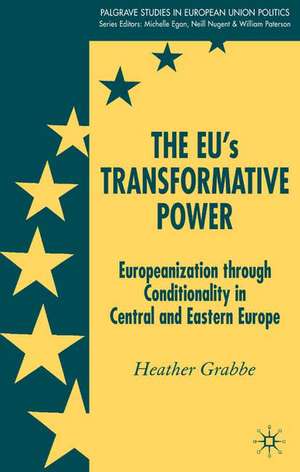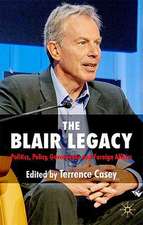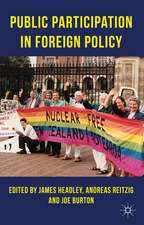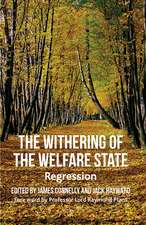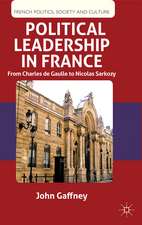The EU’s Transformative Power: Europeanization Through Conditionality in Central and Eastern Europe: Palgrave Studies in European Union Politics
Autor H. Grabbeen Limba Engleză Hardback – 10 noi 2005
| Toate formatele și edițiile | Preț | Express |
|---|---|---|
| Paperback (1) | 326.92 lei 39-44 zile | |
| Palgrave Macmillan UK – 10 noi 2005 | 326.92 lei 39-44 zile | |
| Hardback (1) | 387.96 lei 6-8 săpt. | |
| Palgrave Macmillan UK – 10 noi 2005 | 387.96 lei 6-8 săpt. |
Din seria Palgrave Studies in European Union Politics
- 20%
 Preț: 691.32 lei
Preț: 691.32 lei - 20%
 Preț: 691.52 lei
Preț: 691.52 lei - 9%
 Preț: 798.62 lei
Preț: 798.62 lei - 20%
 Preț: 755.99 lei
Preț: 755.99 lei -
 Preț: 282.28 lei
Preț: 282.28 lei - 18%
 Preț: 889.75 lei
Preț: 889.75 lei - 20%
 Preț: 690.39 lei
Preț: 690.39 lei -
 Preț: 243.89 lei
Preț: 243.89 lei -
 Preț: 388.72 lei
Preț: 388.72 lei -
 Preț: 388.72 lei
Preț: 388.72 lei -
 Preț: 393.52 lei
Preț: 393.52 lei -
 Preț: 392.60 lei
Preț: 392.60 lei -
 Preț: 390.25 lei
Preț: 390.25 lei -
 Preț: 390.63 lei
Preț: 390.63 lei -
 Preț: 389.70 lei
Preț: 389.70 lei -
 Preț: 387.96 lei
Preț: 387.96 lei -
 Preț: 391.61 lei
Preț: 391.61 lei -
 Preț: 391.61 lei
Preț: 391.61 lei -
 Preț: 392.60 lei
Preț: 392.60 lei -
 Preț: 386.81 lei
Preț: 386.81 lei -
 Preț: 390.63 lei
Preț: 390.63 lei -
 Preț: 386.00 lei
Preț: 386.00 lei -
 Preț: 392.60 lei
Preț: 392.60 lei -
 Preț: 388.72 lei
Preț: 388.72 lei - 15%
 Preț: 645.79 lei
Preț: 645.79 lei -
 Preț: 391.61 lei
Preț: 391.61 lei - 15%
 Preț: 645.47 lei
Preț: 645.47 lei -
 Preț: 392.21 lei
Preț: 392.21 lei -
 Preț: 386.81 lei
Preț: 386.81 lei -
 Preț: 390.63 lei
Preț: 390.63 lei -
 Preț: 390.63 lei
Preț: 390.63 lei -
 Preț: 387.75 lei
Preț: 387.75 lei -
 Preț: 389.88 lei
Preț: 389.88 lei -
 Preț: 388.52 lei
Preț: 388.52 lei -
 Preț: 391.61 lei
Preț: 391.61 lei -
 Preț: 400.26 lei
Preț: 400.26 lei -
 Preț: 387.75 lei
Preț: 387.75 lei -
 Preț: 386.81 lei
Preț: 386.81 lei -
 Preț: 388.72 lei
Preț: 388.72 lei -
 Preț: 389.88 lei
Preț: 389.88 lei -
 Preț: 391.61 lei
Preț: 391.61 lei -
 Preț: 389.70 lei
Preț: 389.70 lei -
 Preț: 386.81 lei
Preț: 386.81 lei -
 Preț: 389.88 lei
Preț: 389.88 lei -
 Preț: 388.72 lei
Preț: 388.72 lei - 15%
 Preț: 643.48 lei
Preț: 643.48 lei - 15%
 Preț: 582.63 lei
Preț: 582.63 lei -
 Preț: 398.35 lei
Preț: 398.35 lei - 15%
 Preț: 644.18 lei
Preț: 644.18 lei
Preț: 387.96 lei
Nou
Puncte Express: 582
Preț estimativ în valută:
74.24€ • 77.67$ • 61.67£
74.24€ • 77.67$ • 61.67£
Carte tipărită la comandă
Livrare economică 03-17 aprilie
Preluare comenzi: 021 569.72.76
Specificații
ISBN-13: 9781403949035
ISBN-10: 1403949034
Pagini: 224
Ilustrații: XVII, 231 p.
Dimensiuni: 140 x 216 x 14 mm
Greutate: 0.41 kg
Ediția:2006
Editura: Palgrave Macmillan UK
Colecția Palgrave Macmillan
Seria Palgrave Studies in European Union Politics
Locul publicării:London, United Kingdom
ISBN-10: 1403949034
Pagini: 224
Ilustrații: XVII, 231 p.
Dimensiuni: 140 x 216 x 14 mm
Greutate: 0.41 kg
Ediția:2006
Editura: Palgrave Macmillan UK
Colecția Palgrave Macmillan
Seria Palgrave Studies in European Union Politics
Locul publicării:London, United Kingdom
Cuprins
Abstract
About the Author
List of Tables
Abbreviations
Acknowldgements
Introduction
Accession Conditionality and its Implications
Europeanization, Negotiations and Influence
Routes of Europeanization and Constraints on EU Influence
The Receiving End: Politics in the Candidate Countries
Free Movement of Persons in the Single Market
Movement of Persons under Schengen
Explaining How EU Influence Worked
Conclusion
Notes
Bibliography
Index
About the Author
List of Tables
Abbreviations
Acknowldgements
Introduction
Accession Conditionality and its Implications
Europeanization, Negotiations and Influence
Routes of Europeanization and Constraints on EU Influence
The Receiving End: Politics in the Candidate Countries
Free Movement of Persons in the Single Market
Movement of Persons under Schengen
Explaining How EU Influence Worked
Conclusion
Notes
Bibliography
Index
Recenzii
"The EU's big bang enlargement in 2004 was a major milestone in the history of European integration. Thanks to the carrots and sticks of conditionality the EU had enormous potential influence. In her detailed, meticulous and landmark study, focusing in particular on the single market and Schengen, Heather Grabbe demonstrates how and why the EU's 'transformative power' varied across the region, over time and from policy area to policy area." - Dr. Tim Haughton, University of Birmingham, UK
"The EU's Transformative Power is an important book. It lends relevant insider insights into the process of enlargement and it is an obligatory guide for anyone interested in the present and the future of European enlargement." - Transitions Online
"The EU's Transformative Power is in a position to offer a major reference point in the Europeanization discourse. Grabbe's book does indeed stand up to such promise and provides an authoritative resource on the effects of EU influence in CEE." - Journal of Intervention and Statebuilding
"The EU's Transformative Power is an important book. It lends relevant insider insights into the process of enlargement and it is an obligatory guide for anyone interested in the present and the future of European enlargement." - Transitions Online
"The EU's Transformative Power is in a position to offer a major reference point in the Europeanization discourse. Grabbe's book does indeed stand up to such promise and provides an authoritative resource on the effects of EU influence in CEE." - Journal of Intervention and Statebuilding
Notă biografică
Heather Grabbe is Director of the Open Society European Policy Institute, Brussels, Belgium. From 2004 to 2009 she was senior advisor to then European Commissioner for Enlargement Olli Rehn, responsible in his cabinet for the Balkans and Turkey. Before joining the commission, she was deputy director of the Centre for European Reform, the London-based think tank, where she published widely on EU enlargement and other European issues. Previous research posts include Chatham House, the European University Institute and Wolfson College, Oxford University.
Textul de pe ultima copertă
Between 1989 and 2004, the EU's conditionality for membership had major transformative effects in Central and East Europe. The author analyses how that transformation worked in practice. She explores how the EU used its bargaining power coercively at certain key points in the membership preparations, but concludes that its primary method was soft power, through 'Europeanizing' the candidates into its norms and methods. This book explores in detail how the EU used its influence to control the movement of people, through both conditionality and Europeanization.
Caracteristici
An original study into how the EU influenced Central and East European candidate countries prior to membership The book brings together the insights of the literatures on Europeanization and postcommunist transition Author's reputation and standing in the field current advisor to the EU Commissioner for Enlargement
